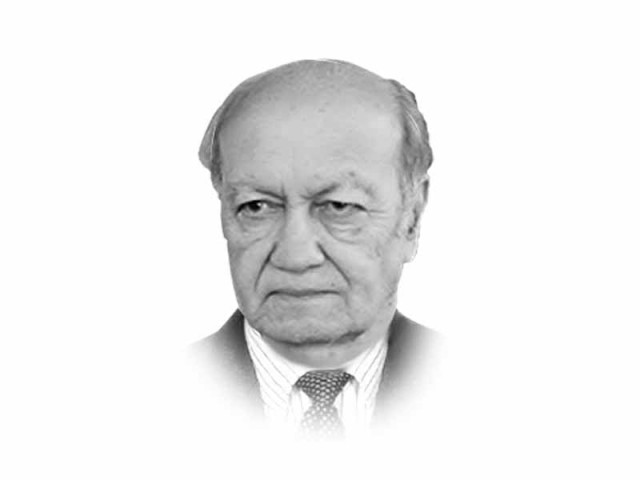Pakistan’s fight against terror
The ideological aspect of counterinsurgency operations seems to have been accorded low priority by the government

The writer is a retired lieutenant general of the Pakistan Army and a former federal secretary. He has also served as chairman of the Pakistan Ordnance Factories Board
The government continues to neglect the development and integration of Fata in bringing it into the mainstream. All human development indicators of Fata provide sharp pointers towards the pathetic state of development. Leaving it administratively and politically in its present state so that the region remains frozen in time is a great disservice to the people of that area. In agencies where the security situation has stabilised, time should not be lost in initiating economic and political development. There had been feeble attempts during the previous PPP government at introducing legislation to empower the people of Fata and bring them on a par with the rest of the country. With no follow-up by the PML-N, it can be assumed that the same mentality of keeping this area as a buffer zone as prevailed during the British period, continues.
In Fata, especially in North and South Waziristan and Khyber Agency, the government will find it difficult to resettle the IDPs under the prevailing conditions as weak infrastructure, further destroyed and degraded by bombardment, and ground fighting pose serious problems in resettlement. While the government is providing monetary assistance of sorts, the task at hand is not an easy one. The greatest challenge will be finding jobs, for which the government will have to create opportunities and the requisite funding. Resolute military action has pushed the militants out, but without follow-up action, conflict and despair could return. There are many fighting jihad as a means of earning livelihoods. It is crucial to prevent the youth from being lured back by militant groups. The government has taken several measures to squeeze sources of funding to jihadi networks but a lot more still needs to be done. These include targeting the drug mafia, keeping close scrutiny on donations from the Gulf countries and harsh punishment for those engaged in kidnappings for ransom. Rehabilitation of IDPs should be the government’s top priority. They have suffered a lot and every effort should be made to settle them back in their homes. The government’s compensation should at least cater to their basic needs. The de-radicalisation programme should be taken seriously to rehabilitate those who are willing to give up militant activity and revert to being a part of society. As regards reformed militants, it has to be ensured that they are able to earn their living and reintegrate into society. Those who remain incorrigible will have to be confronted by force.
Instability in Fata directly impacts the rest of Pakistan and especially the adjoining provinces of Khyber-Pakhtunkhwa and Balochistan. Similarly, relations with Afghanistan will always remain problematic if the tribal belt remains anarchic. Political stability, improved security and economic development on our side of the border could serve as a model for the eastern and southern provinces of Afghanistan. Potential for the Islamic State (IS) to exploit weaknesses in governance and the discontent of the returning IDPs also cannot be ruled out. Already there are reports that the IS has been trying to develop contacts with the TTP and other militant groups in the region.
The ideological aspect of counterinsurgency operations seems to have been accorded low priority by the government. It seems it has outsourced this responsibility to the army too although this strictly falls in the government’s domain. The battle of ideas becomes even more important because the new generation of militants is more attracted towards hardline ideologies and likely to associate with the IS if conditions deteriorate. The younger generation of militants is highly vulnerable to the propaganda that is spewed by these groups to glorify the struggle and chronicle their achievements. It is very much possible that the message for violent change resonates, especially with some splinter groups of the TTP.
Another major challenge that the country faces is to change the extremist mindset that has its genesis in national strategies that Pakistan adopted against the Indian occupation of Kashmir and Afghanistan’s jihad against the Soviet Union. Countering this mindset would also require strengthening democratic institutions. Debates in parliament and seminars conducted by think tanks can help in building a strong national narrative against militancy and radicalism. Related to this is the reformation of madrassas and here, too, the government has been reluctant to impose its writ fearing that it will invite reaction from conservative religious political parties and sympathetic militant outfits. Sooner, rather than later, the government will have to ensure that all seminaries are registered, as it cannot allow a situation where there are madrassas operating as islands without any credible oversight.
Despite shortcomings in policy and implementation, the TTP and other militant groups are certainly losing support when it comes to the hearts and minds of the Pakistani public. This could largely be attributed to the success of military operations and reaction to the horrific attack at the Army Public School in Peshawar, and the excesses committed by them generally.
Published in The Express Tribune, May 13th, 2015.
Like Opinion & Editorial on Facebook, follow @ETOpEd on Twitter to receive all updates on all our daily pieces.















COMMENTS
Comments are moderated and generally will be posted if they are on-topic and not abusive.
For more information, please see our Comments FAQ